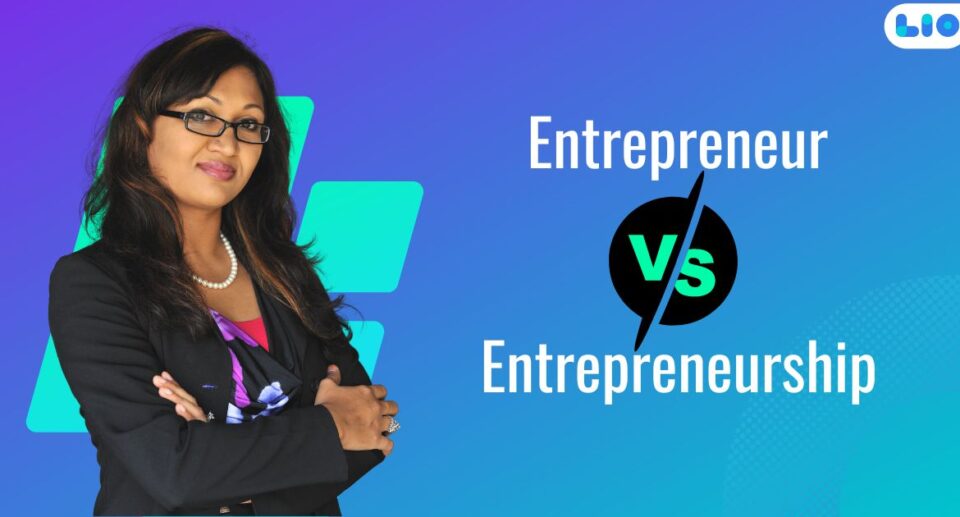Understanding The Difference Between An Entrepreneur And An Entrepreneurship

Wondering what is the difference between an entrepreneur and entrepreneurship? read the article to know all about it and more.
Entrepreneur and entrepreneurship are two terms that are often used interchangeably, but they actually have different meanings. While an entrepreneur is an individual who starts and manages a new business venture, entrepreneurship refers to the process of creating, developing, and managing a new business.
In this article, we will delve into the differences between an entrepreneur and entrepreneurship, and explore how these two concepts are related.
What is an Entrepreneur?
An entrepreneur is an individual who starts a new business venture with the aim of making a profit. They are often viewed as risk-takers who are willing to take on the challenges of starting a new business and are known for their ability to identify new opportunities and turn them into successful business ventures.
Entrepreneurs come from all walks of life and can be found in a variety of industries, from technology and finance to retail and hospitality. Some of the world’s most successful entrepreneurs include Bill Gates, Elon Musk, Jeff Bezos, and Oprah Winfrey, all of whom have built their businesses from scratch and have become industry leaders in their respective fields.
Basically an entrepreneur:
- A beginner in the market, who has something new to offer to society and starts right from scratch to establish and run the enterprise.
- An innovator, who has a thought-provoking idea or concept in his/her mind, has the capability to lead the marketplace.
- A developer, develops a business model, to give shape to the idea.
- A leader, who provides guidance and support to his/her men, to work in a specific direction or change the same (if required) so as to achieve the target.
- An in charge who is accountable and responsible for the success or failure of the venture, and for the decisions made by him/her.
- A promoter, who takes all the appropriate steps to turn the dream into reality.
- A forecaster foresees future opportunities and threats that can affect the venture, positively or negatively.
- A risk-taker, who has the ability to anticipate the risk in future moves, and take the risk, if they are beneficial to the enterprise.
What is Entrepreneurship?
To understand the difference between an entrepreneur and entrepreneurship now let us understand what entrepreneurship is. Entrepreneurship, on the other hand, is the process of creating, developing, and managing a new business venture. It involves identifying a market need, developing a business plan, raising capital, hiring employees, and managing the day-to-day operations of the business.
Entrepreneurship is not just limited to starting a new business venture from scratch. It also includes activities such as innovation, research and development, and the creation of new products and services. In fact, many established businesses and corporations have entire departments dedicated to entrepreneurship and innovation.
Entrepreneurship is characterized by various distinct traits that are crucial for the success of any new business venture. These characteristics are as follows:
- Process-oriented: Entrepreneurship is a systematic and continuous process that requires creativity and purposeful planning to operate smoothly.
- Innovation: One of the defining features of entrepreneurship is innovation, which helps businesses differentiate themselves in the marketplace and introduce new products and services.
- Development of networks: Developing strong relationships with stakeholders such as suppliers, distributors, creditors, and debtors is essential for building a good reputation in the market.
- Profit potential: Profitability is a primary consideration for any entrepreneur, and all business decisions are made with the potential for profit in mind.
- Market trend forecasting: Entrepreneurs must keep a close eye on market trends and future demands to continuously improve their products or services and remain competitive.
- Risk assumption: Risk-taking is an inherent part of entrepreneurship, and entrepreneurs must be willing to take calculated risks to reap rewards and succeed in the long run.
Comparison Chart Between An Entrepreneur And Entrepreneurship
| BASIS FOR COMPARISON | ENTREPRENEUR | ENTREPRENEURSHIP |
|---|---|---|
| Meaning | An entrepreneur is an individual or a team thereof, having an innovative idea, and taking every step to turn the idea into reality while bearing the risks. | Entrepreneurship is the risky activity of commencing a business usually a start-up company, offering distinct products and services to the target customers, which may or may not get successful. |
| What is it? | A person who has an idea and gives shape to it. | A process that gives shape to the idea. |
| Represents | An innovator, who chased the dream, till it becomes true. | A procedure through which an innovation is done. |
| Business Venture | He/She is the one who sets up the business venture, to turn a concept into reality. | It is the activity, which an entrepreneur undertakes to set up the business venture. |
Differences Between An Entrepreneur and Entrepreneurship
Let us know read in detail about the difference between an entrepreneur and entrepreneurship.
Definition
One of the main difference between an entrepreneur and entrepreneurship. As mentioned earlier, an entrepreneur is an individual who starts and manages a new business venture. Entrepreneurship, on the other hand, refers to the process of creating, developing, and managing a new business.
Focus
Entrepreneurs are focused on the creation and management of a new business venture. They are often driven by the desire to make a profit and create something new and innovative.
Entrepreneurship, on the other hand, is focused on the process of creating and managing a business, and encompasses activities such as innovation, research and development, and the creation of new products and services.
Risk-Taking
The next difference between an entrepreneur and entrepreneurship is risk-taking. Entrepreneurs are often viewed as risk-takers who are willing to take on the challenges of starting a new business.
They are willing to invest their time, money, and resources into a new venture, even if there is a high risk of failure. Entrepreneurship, however, is not just about taking risks. It also involves careful planning, market research, and strategic decision-making.
Creativity
Entrepreneurs are known for their creativity and ability to identify new opportunities. They are often driven by the desire to create something new and innovative.
Entrepreneurship, on the other hand, requires creativity and innovation at every stage of the process, from identifying a market need to developing a new product or service. This is another important difference between an entrepreneur and entrepreneurship.
Management
The next difference between an entrepreneur and entrepreneurship is management. Entrepreneurs are responsible for the management of their new business ventures.
They must make strategic decisions, manage employees, and ensure the business’s success. Entrepreneurship, however, is not just about management. It also involves activities such as marketing, sales, and product development.
Scale
And the last difference between an entrepreneur and entrepreneurship is scale. Entrepreneurs may start with a small business venture and grow it over time, or they may have a vision for a large-scale enterprise from the outset. Entrepreneurship, however, can apply to businesses of all sizes, from small startups to large corporations.

Maximize Your Online Business Potential for just ₹79/month on Lio. Annual plans start at just ₹799.
How Lio can Help You
To make your dreams come true of having a business of your own and managing it nicely, Lio App can help you big time. The app lets you keep all sorts of data together in a more organized manner. You can keep records, and create tables and lists while working solo or with a team.
The many features of Lio would help you with your retail business as you would be able to maintain all data on a track that you can use at any time. If you want to upload a document, then you can do that. Know the money transactions, cash inflow, profit and loss you are making, Udhaar, list of products, services, and even the teammates and clients that you have all in one place.
Your retail business ideas will certainly become successful businesses if you go on this journey of managing your business with Lio.
Step 1: Select the Language you want to work on. Lio on Android

Step 2: Create your account using your Phone Number or Email Id.

Verify the OTP and you are good to go.
Step 3: Select a template in which you want to add your data.

Add your Data with our Free Cloud Storage.
Step 4: All Done? Share and Collaborate with your contacts.

Conclusion
In conclusion, while the terms entrepreneur and entrepreneurship are often used interchangeably, they actually have different meanings. An entrepreneur is an individual who starts and manages a new business venture, while entrepreneurship refers to the process of creating, developing, and managing a new business. Understanding the differences between an entrepreneur and entrepreneurship is essential for anyone interested in starting their own business or studying entrepreneurship.
In today’s rapidly changing business landscape, entrepreneurship has become a crucial skill for individuals and organizations. The ability to identify new opportunities, develop innovative products and services, and adapt to changing market conditions has become essential for businesses to remain competitive and succeed in the long term.
Entrepreneurship education has also become increasingly important in recent years, with many universities and colleges offering courses and programs in entrepreneurship. These programs provide students with the knowledge, skills, and tools they need to start and manage their own businesses and innovate and contribute to the growth of existing businesses.
Whether you are an aspiring entrepreneur or a business professional looking to develop your entrepreneurial skills, understanding the difference between entrepreneur and entrepreneurship is key to your success. By focusing on the process of creating, developing, and managing a new business venture, you can develop the skills and knowledge you need to succeed in today’s dynamic and ever-changing business world.
Hope by now you have understood the difference between an entrepreneur and entrepreneurship.
Frequently Asked Questions(FAQs)
What is an entrepreneur?
An entrepreneur is an individual who starts and manages a new business venture with the aim of making a profit. They are known for their ability to identify new opportunities and turn them into successful business ventures.
What is entrepreneurship?
Entrepreneurship is the process of creating, developing, and managing a new business venture. It involves identifying a market need, developing a business plan, raising capital, hiring employees, and managing the day-to-day operations of the business.
Are entrepreneurs only focused on making a profit?
While entrepreneurs are often driven by the desire to make a profit, this is not always their sole focus. Many entrepreneurs are also driven by the desire to create something new and innovative, solve a social or environmental problem, or make a positive impact on their community.
Can entrepreneurship apply to businesses of all sizes?
Yes, entrepreneurship can apply to businesses of all sizes, from small startups to large corporations. The principles of entrepreneurship, such as innovation, creativity, and adaptability, can be applied to businesses of all types and sizes.
Why is entrepreneurship education important?
Entrepreneurship education is important because it provides students with the knowledge, skills, and tools they need to start and manage their own businesses, as well as to innovate and contribute to the growth of existing businesses.
In today’s rapidly changing business landscape, entrepreneurship has become a crucial skill for individuals and organizations alike.







